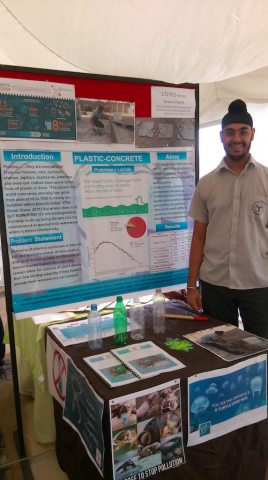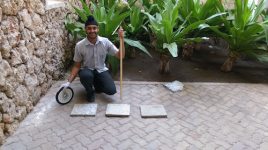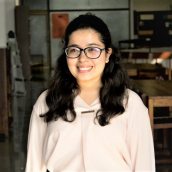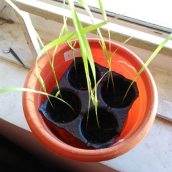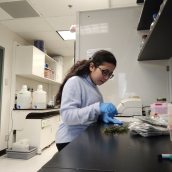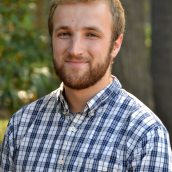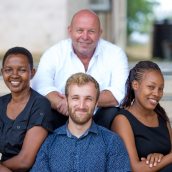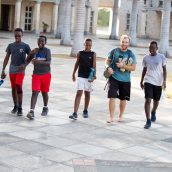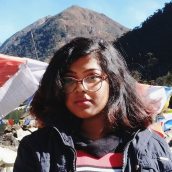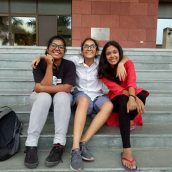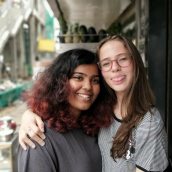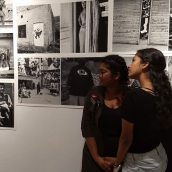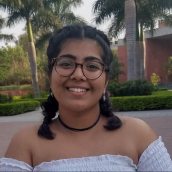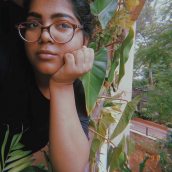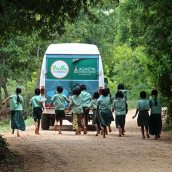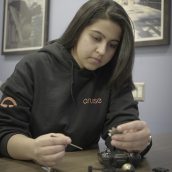Prabhdeep Lochab: Seeking simple solutions to global problems
Being a global citizen, leader and environmental enthusiast is no easy task. Prabhdeep Lochab’s story is a testament to the hard work, dedication and commitment that goes into innovating “green” solutions for a sustainable future.
A second-year Diploma student at the Aga Khan Academy campus in Mombasa, Prabhdeep Lochab was the gold medal recipient at the Golden Climate International Science Fair Olympiad for his “plastic concrete” invention.“I wanted to come up with something unique which was practical and easy to carry out,” Prabhdeep says. For his project, Prabhdeep aimed to alleviate pollution in construction, using plastic in a concrete-mix for construction of infrastructure for non-commercial construction. This concrete could be used to construct walkways, driveways, and parks.
When asked about his motivation to pursue a science project for the fair, Prabhdeep said “I have a personal interest in science and I love inventing and being creative to help find solutions to everyday problems.” The simple yet effective solution Prabhdeep managed to devise exhibits his passion for the sciences, as well as his passion to solve environmental issues on a local and global level.
When reflecting on the process, Prabhdeep claimed that it was very challenging to balance school work and extracurricular activities along with finding time to work on his invention.
“I would come up with a new idea every meeting and it was rejected as being either to simple or relatively complicated to carry out. It was very frustrating but I was committed and I kept on trying,” he says.
He appreciates the meeting time he had during the science club that was offered, as he was able to use that time to discuss his ideas with teachers and create a research plan. “We met once every week on Tuesday to discuss the progress of our ideas and concepts that we wanted to use as our projects. Being a part of this group really pushed me to my limits.”
After much struggle and careful mentoring from his science teachers, Mr Godfrey Kokeyo and Mr Charles Gumba, at the Academy, Prabhdeep’s project progressed to the national level. For Prabhdeep, the experience was already so fulfilling because of the hard work, dedication and commitment that went into creating the project. “I realized what a huge event this was and that it was something big to come as far as I had. I knew that I had achieved something great even if I didn’t win anything,” Prabhdeep shared.
Prabhdeep had the opportunity to represent the Academy and his country, Kenya, at the international level at the Golden Climate International Science Fair Olympiad. His project was shared with various ministers from Kenyan environmental authorities and also in front of a panel of judges, who are all acclaimed scientists in their respective fields. His work was particularly recognized for the detailed lab report, experimentation process and presentation of data using a diverse range of media (graphs, text, etc).
Prabhdeep and his parents were both pleasantly surprised when his project was not only awarded the gold medal in his category, but was also awarded a special prize from the National Environmental Management Authority.
For Prabhdeep, this opportunity was so rewarding as he claims it helped him increase awareness of his personal strengths and helped him grow as an individual.
Through this experience, not only was Prabhdeep able to devise a simple solution to help alleviate pollution, but he was also able to apply skills learned in the classroom at a practical level such as writing lab reports and representing data. His hard work, dedication and commitment to make the world a better place is evident in the accolades his project received at the Golden Climate International Science Fair Olympiad.
By Karishma Bhagani
Sarah Keshvani (Class of 2018): using biology to tackle environmental challenges
Sarah’s love for the sciences flourished during the Diploma Programme (DP) at the Academy in Hyderabad. Through her extended essay, she found the opportunity to learn more about how biology can provide solutions to modern challenges faced in local communities. She decided to tackle the issue of water shortages and soil nutrient deficiencies hindering large scale rice cultivation in the state of Telangana, leading to reduced crop yields. Due to zinc deficiencies in the soil, farmers resort to using huge amounts of fertilisers, which further degrade soil quality.
Sarah’s research centred on hydroponics as a possible solution to this problem. Plants are grown in water-based, nutrient solutions instead of soil.
“This technique has recently garnered a lot of attention because experiments have shown that growth is more than doubled when compared to traditional methods of agriculture,” Sarah explained. “Nutrient uptake is more efficient, and farmers can control the type of nutrients the plant is exposed to, in order to enhance different features of the yield. The use of water in hydroponics is still much more efficient than how it is used in open paddy fields that need to be covered in water during certain times of the crop cycle.”
Sarah’s conclusions were positive. Rapid growth was observed and the flexibility to control the nutrient uptake played a huge role in optimal plant health. She realised that a closed system would have provided more accurate results, as the higher evaporation rates disturbed the pH levels. Overall though, she deduced this technique could definitely tackle the challenges faced by paddy farmers.
“The IB curriculum followed at the Academy has played a pivotal role in building many essential skills for university life,” Sarah reflected when asked how she has settled into this new phase. “The emphasis on academic integrity and independence have served me really well here. I was taught to think critically rather than blindly follow textbooks. Its skill-based learning approach, and connecting classroom learning to the real world, also prepared me well for higher education.”
Residential Academy
Ryan Herman: Helping students realise their potential
Before we enter the 2019 – 2020 academic term, we would like to spotlight a few staff from AKA Mombasa who are going on to pursue new adventures in the upcoming academic year. Here, we take a look at Academy fellow Ryan Herman and his two years at the Academy.
Ryan Herman is from New Hampshire, New England and was an Academy fellow at the Aga Khan Academy Mombasa. Ryan was part of the Academy’s Enrichment and Service Learning programme, and later moved on to support the Admissions and Learning Support department and the Academy’s Talent Identification Programme.
Through his time at the Academy, Ryan said he has learnt so much, which he knows will benefit him in the future.
“I have truly loved my experience and not looking forward to leaving at all, although I am very excited to arrive into my next position,” Ryan said. “I have grown a lot in this role, and through my students, I have taken on many learning experiences and moments of growth that I didn’t expect to happen. The Academy has offered me significant professional development in a variety of different aspects. But most importantly, I think my time at the Academy has taught me the importance of mentorship and has helped me value the teacher-student relationship and the type of role-model I like to be. I have experienced and discovered endless learning moments that education centers like our own can offer to its students, staff and community. For this reason, the Academy has solidified my want to stay in education, or at least working in fields that heavily involve youth.”
Ryan said he would not be where he is now if it wasn’t for the support the AKA Mombasa community provided him with during his time here.
“I feel like I came in very unsure of my way forward, mostly knowing that I enjoyed working with students and liked being out of my comfort zone,” Ryan said. “I now feel like I have a much more clear understanding of my way forward in life and what I hope to achieve, and I contribute a lot of that to the mentorship and experiences I’ve had in the Admissions department and through my boss, Kauthar Mohamed. I have come under the wing of many inspirational and thoughtful leaders, such as Kauthar, Paul Davis, Jane Okello, Minal Shah, Ruki Husain, Nuala Alibhai, Alice Ndungu, Bhagirathy Jhingran, Clare McLaughlin, etc., who have driven me crazy with aspirations for myself and my future. I feel extremely fortunate for the many circumstances that had fallen into place, somewhat coincidentally, that made my two years very unique. The most rewarding aspect of my time here was being given the support and trust to embark in my own direction and being able to make those simple initial steps concrete themselves into something tangible and beneficial.”
During his two years, Ryan has contributed to various parts of the school. Ryan was involved with the Exchange Programme’s pilot year between AKA Mombasa and AKA Hyderabad, supported the annual TEDxYouth event and strengthened the Talent Identification Programme at the Academy.
“Our network puts in immense amount of effort to empower different, disadvantaged communities around the world through education, and the Talent Identification Programme is a very tangible approach to that goal,” Ryan said. “Starting from a singular programme in January of 2018 that welcomed in year 6 students, the programme has grown to be able to tackle so much more. We now run six programmes throughout the course of a year, handle four rounds of orientations annually, have devised an integration program for English Language Learners, provide weekly tuition for those with greater academic gaps, documented and analyzed academic trajectories and histories for four of the seven cohorts, and now support the processes of assessment, identification and communication with families.”
Ryan’s passion for working with talented students from varying backgrounds will be seen through his new position at Imagine Scholar.
“I will be working for Imagine Scholar, a non-profit in South Africa focused on providing opportunities in education for rural students,” Ryan said. “We, as the Academy, are partners with Imagine Scholar through our role in the HALI (High Achieving, Low Income) Access Network. I will be stepping in as a programme manager, focusing particularly on a programme for talented high school students.”
Kauthar Mbwana (Mohamed), the Student Leadership and Service Learning Coordinator and Senior School Enrichment Coordinator, has worked with Ryan since he came to the Academy. Kauthar said Ryan’s work ethic was very admirable and she is happy to see the person he has become during his time at the Academy.
“The first day I met Ryan and he cracked a joke I knew that we would be the best of coworkers,” Kauthar said. “Ryan is hardworking and a perfectionist when it comes to work. He would take up any task given to him and work to his level best. Ryan helped bring to life the enrichment portal that allows students to sign-up online among many other enrichment tasks. He has also taken his year 7 disability Service Learning programme to different heights, from the activities he does, to the learning experiences that occur. His thirst to do better and personal growth didn’t stop only at his main roles; he took up on more just so that he can maximise his two years at the Academy. Ryan’s charming personality shall be missed dearly; not just his passion and commitment to work, but his smile that lights up anyone’s day. We wish him well in his future endeavors.”
Sujana Veeramachaneni: Teacher, Assistant Coordinator, Dorm Parent, Mentor
At the Aga Khan Academy Hyderabad, Sujana Veeramachaneni holds more than her official titles of biology teacher and Assistant Coordinator for the Diploma Programme (DP), science teacher for the Middle Years Programme, and dorm parent. Sujana also ensures her students see her as a friend, mentor and pillar of support.
“They should always feel that I’m there for them, no matter the situation, or condition or time of day,” she insists. “Sometimes I get midnight phone calls! They don’t hesitate to approach me.”
Since the majority of DP students live on campus, “My job doesn’t end in the school,” she explains. “We see them as students, and the dorm is like a home for them – so it’s like seeing them at school and at home – same child, different behaviour. Sometimes it’s difficult to draw a line, because we see them here as well as in the school – so that emotional role is with us, also."
“Of course, I have to draw the line – otherwise maintaining discipline is quite difficult – but at the same time, that line is flexible. It’s not firm – but of course, there is a thin line.”
From her side, Sujana believes that she and other staff can learn from the students’ impressive ability to control their emotions at school. “These are all teenagers,” she reflects. “We see them here, inside and outside. Sometimes, even we lose control – but the students don’t have tantrums in front of their teachers. That’s what I learn from them – how to control our emotions.”
Sujana remembers what she went through at her students’ ages, and understands the pressures they face, especially those approaching graduation from the Diploma Programme, who face multiple deadlines, university applications, and academic and personal challenges. “I always put myself in their shoes,” she emphasises, and shares with her students her anecdotes on how she dealt with stress as a student.
At the same time, she acknowledges times have changed. “This generation is under more pressure – we were not exposed to so many kinds of media or diversions. They are dealing with many things at the same time – compared to them, when we were students, we had less complexity in our lives.”
The demanding IB curriculum motivates Sujana as a teacher, even though her switch to a career in teaching was first supposed to be temporary. Sujana holds an MSc in life sciences, with a specialisation in endocrinology, and a PhD in plant physiology. Her research focused on the physio-biochemical parameters of the post-harvest life of roses, after which she worked in post-harvest floriculture in Bangalore. In 2002 she relocated to Hyderabad and started working as a teacher in an international school.
She was drawn to the demanding and challenging nature of the International Baccalaureate curriculum and in 2013 joined the Aga Khan Academy as a biology teacher. Her career at the Academy has been a learning trajectory: “I’m definitely enjoying the professional development here.” She highlights the different positions she has held over the years, as well as gaining confidence over the years in teaching, helping, and guiding Special Education Needs (SEN) students, and the training, support and resources she has received from the SEN specialist at the Academy.
She also appreciates that the Academy itself is always developing – every year different projects, opportunities and ideas are introduced or planned for the future, and she praises the community service that the school ensures students experience: “It is inculcated in the students – the mission itself is very good and strong.”
The Academy is also always learning from its students; if, for example, some students stand out at drawing or music, the staff will learn from those strengths, and apply what they learn with students in the next batch. The curriculum is reviewed every year, and coordinators and deans take sessions every year to improve and upgrade their skills.
Academically, Sujana especially appreciates the opportunities students have to explore their own interests and to learn independently – “That is the beauty of the Extended Essay.”
“It’s very dynamic,” she explains, and she describes the Extended Essay as a “piece of research work, where the student will find their passion” and submit an essay akin to a mini-thesis.
Because “the curriculum has the scope to identify the strength of the student in different ways” and “the student will design their own labs,” independence and the opportunity to follow one’s own interests is important: “Every student’s choice is different,” she says.
As their teacher, Sujana enjoys the intricacies of guiding the students individually and tailoring her teaching style to their interests and strengths. This year, she is supervising six students, whose self-selected Extended Essay projects explore a range of topics including hydroponics, the greenhouse effect and carbon dioxide concentrations, mushroom cultivation, seed germination, and the effect of music on the growth of plants.
Sujana enjoys being able to show her dynamic, expressive side at the Academy and the freedom of teaching styles and resources that is not always available at other schools. But she finds even more satisfaction in mentoring than in teaching, and it is most rewarding when her students achieve their goals – obtain university admission, get their diploma, or overcome an obstacle when they thought they couldn’t cope, but were “able to achieve something with our guidance.”
She emphasises the need to be adaptable and compassionate towards her students, both for academic and emotional support. “You have to tailor yourself to the needs of the students because some students, you really have to encourage them, motivate them, and some students – at times you have to be firm, strict,” she explains. “I change myself, as per their needs.”
When asked what she envisions for her students’ futures, Sujana replies that she wants them to identify their passions and to continue doing what they like. “I want them always to be confident.
By Natasha Pirani
Eshwari Ramsali (Class of 2018) - fusing art and ideology
“Honestly, it still hasn’t hit me that I get to go to the college of my dreams,” she said. “It’s so surreal.”
Two years ago Eshwari wrote an entrance assessment test at the Aga Khan Academy Hyderabad but was not sure if she would be able to join.
“I was dismayed because I loved the concept of an IB education,” she said. “The Academy made it possible for me to be here.”
Eshwari joined the Academy in 2016 and used every opportunity to learn and to express herself, diving into visual arts and global politics courses. She attributes a lot of her personal and intellectual growth to the discussions she had in her Theory of Knowledge (ToK) class.
“It upsets me that I will never have another ToK class,” she mused.
After her creativity, activity, service (CAS) summer internship in Dehradun, Uttarakhand, Eshwari stayed on to do an internship at a film production house, working in production and postproduction on documentary films.
“I like to call it the summer I became a feminist,” she said. “Feminism, for me is a social movement whose success lies in providing equal opportunities for all sexes and genders.”
For Eshwari, it is natural for film and feminism to go together. She describes art and politics as her academic crushes and appreciates the IB for having the accoutrements that allow for interdisciplinary approach to learning. Her extended essay combined visual arts and global politics to write a compelling piece on freedom of expression and art activism. Eshwari’s display at the 2018 Diploma Programme Visual Arts Exhibition also espoused the mingling of subjects, presenting work with powerful feminist overtones.
“Eshwari has exemplary artistic calibre,” said Senior School art teacher, Vijayraghavan Srinivasan. “She has a meta-narrative quality in her pictorial composition which captures recollecting past memories and incidents, fusing them with self-discovery."
The DP Visual Arts Exhibition is a red letter day for Senior students and they work long hours to see it come to life.
“Personally explaining my art and concepts to viewers and seeing realisation dawn on their faces was incredibly rewarding,” Eshwari said. “The exhibition was so important for so many different reasons, and being a part of it with some of the most talented students of the Academy made me happy.”
Eshwari remembers not being confident about her decision to join the arts programme at the Academy, but she’s pleased that she did. Through the programme, Eshwari got to work with professional artists and sculptors, and also discovered artists and filmmakers whose work inspires her and helps her identify herself. Vijayraghavan describes her artwork as insightful and contemplative, and also explorative.
Though she is an exceptional artist, Eshwari wants to study political science so she can pursue a career as a humanitarian lawyer or work in development. She intends on taking courses in art history, so that she can seamlessly step back into the art world, should the opportunity arise.
“The idea of being intellectually stimulated even well into my 50s really excites me.”
Somewhere between learning about the IB and her last ToK class, Eshwari fell in love with the Academy.
“I love that my classes are filled with students from all parts of the country,” she said, “irrespective of their financial standing or cultural background. I strongly believe it helps build our vision of pluralism.”
We wish her and all the rest of the Class of 2018 the best of luck in all their future endeavors!
AKA Maputo Literacy Slam
A Literacy Slam will occur on 8 March. Parents are invited to attend this event with their friends and family. For more details, contact school secretaries.
Alisha Sonawalla - pushing the frontiers of technology
Alisha Sonawalla was part of the Aga Khan Academy Hyderabad’s first graduating batch, the Class of 2014. Since then, she has accumulated an extraordinary set of experiences during a gap year and subsequently at university in New York City before joining Microsoft in Seattle, USA this summer (2019). These experiences range from heading projects geared at exposing girls in rural India to coding and internet technologies to designing English language development programmes in Tajikistan, and most recently, to spending summers in Silicon Valley working on self-driving cars.
Alisha is currently working as a software engineer at Microsoft after pursuing a dual degree – a Bachelor of Science in computer science and a Bachelor of Science in management science with a concentration in data science (both from New York University (NYU)). She has received the Dean’s Honour Roll for securing a grade point average in the top 10% of the class. Outside the classroom, she has dabbled in multiple projects including building her own robot news-reader and experimenting with developing a secure cloud-sharing service.“The Academy helped me become comfortable with making mistakes and encouraged me to focus on identifying solutions instead,” Alisha said. “That, and my gap year experiences ignited in me a passion for tech and an entrepreneurial spirit, and ever since, I have been excited about building products to push the frontiers of technology forward.”
“It was an exciting time to be in the mecca of tech,” she reminisces. “I led the development of a large-scale mapping service to deliver real-time, preemptive updates to the vehicle, allowing them to make more efficient routing decisions and enhanced ride safety. As one of the early engineers in the self-driving car space, it was amazing to have the opportunity to contribute towards the future of tech.”
“The girls’ newfound confidence became my motivation as I travelled across India and to Tajikistan conducting sessions for women on STEM opportunities,” shares Alisha.
She was also one of 25 female engineers globally who was awarded the "Goldman Sachs Grace Hopper Conference Scholarship" to attend the Grace Hopper Conference, the largest conference for women in tech.
In 2013, while still at the Academy, Alisha travelled across four remote villages of Gujarat to document the livelihood and survival strategies of a lost community, the Devipujaks. Her interviews and field research were compiled into one of the only ethnographic studies done on this marginalised group of people, and she presented her findings at the National Conference on Human Rights organised by the Central University of Gujarat and the Government of India.
In the meantime, Alisha is joining Microsoft as a software engineer on their AI & Mixed Reality team.
“The Academy gave me the space to develop my moral compass by taking on leadership opportunities and experiencing ethical dilemmas first-hand. Being faced with these ethical decisions on a small scale helped me develop a moral compass that guides me through major decisions even today. Moreover, living in a shared space taught me to adapt to different situations, lifestyles and people, which made my transition to NYU, a new city and a different culture seamless.”
Written by Kamini Menon
Yamini Nibhanupudi (Class of 2014) - Looking at activism through a filmmaking lens
In an honest commentary on the creative process, filmmaker Stanley Kubrick said, “I do not always know what I want, but I do know what I don’t want.” The philosophy behind this method can be extrapolated to the lives of creatives, who wear many hats on their way to becoming who they are. Yamini Nibhanupudi graduated from the Academy in 2014 having focused on maths and sciences in the Diploma Programme. Since then she has roamed the highways of academia, always preferring the scenic route. She studied social sciences, stopped along the way to dabble in research and policy work, and ultimately discovered a passion for filmmaking. “For me,” she says, “deciding to stay in India and continue a life here is the best decision I made.”
Following her high school graduation, Yamini joined the Tata Institute of Social Science, Tuljapur, enrolling in their School of Rural Development. Here she studied political science, gender studies, history and sociology. During this time she worked with the Foundation for Democratic Reforms in Hyderabad, a think tank dealing with policy making. She also interned with Aga Khan Rural Support Program at Khandwa in Madhya Pradesh, working with farmers and marginalized communities. “I always wanted to work with people who spend every single day without any resources at their disposal, to work on the pressing issues that exist in India, issues that most of us never see through our rose tinted glasses.”
“I never lived under the illusion that I would be able to improve the lives of people in India,” she says, adding, “I would like to, but I honestly wouldn’t know where to start.” Writing her final paper as an undergrad, she realized how she could authentically contribute to society. Yamini wrote her dissertation on ‘Gender Roles in the Telugu Film Industry.’ As she delved deep into the paper, she recognized her long held passion for film. She was accepted by TISS Mumbai’s School of Media Studies the same year.
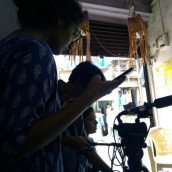 Her choice was validated almost immediately, getting to work at a production house in Mumbai at the end of her first year, and then winning a competition to get a one-minute silent film funded. “A Mute Point” was then screened at the 16mm Film Festival. “It’s been quite a ride since graduating in 2014,” she says looking back, “and I honestly wouldn’t have it any other way.” She is on track to graduate with a Master’s in Media & Cultural Studies in May 2019.
Her choice was validated almost immediately, getting to work at a production house in Mumbai at the end of her first year, and then winning a competition to get a one-minute silent film funded. “A Mute Point” was then screened at the 16mm Film Festival. “It’s been quite a ride since graduating in 2014,” she says looking back, “and I honestly wouldn’t have it any other way.” She is on track to graduate with a Master’s in Media & Cultural Studies in May 2019.
Yamini is a strong proponent of public and government universities. She believes that they are the gateway to a range of education opportunities available in India, and creates an avenue to meet people from across the nation. “I think most people who go to IB schools don’t see India as a viable option to study for their years in university,” she says. “Unfortunately, most of them never truly realise the kind of exposure that you can receive here.” She later adds, “A lot of people might argue that they would gain more exposure and a better understanding about the rest of the world by going abroad. But they have never stepped out of their city in India and a lot of them rarely have friends out of their social class or caste in the country. I've been lucky to learn from wonderful people about the work they've done or that they intend to do with their lives, and India in itself has such wonderful and diverse cultures that I would probably never have ever been exposed to had I studied elsewhere.”
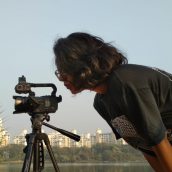 90% of graduates from the Aga Khan Academy Hyderabad have gone on to study abroad, and several students join the IB programme explicitly to have the opportunity to study in the West. Yamini says that an IB education is more than that, and that an education at the Academy was more significant to her than just a stepping stone. “IB teaches you to think critically, and to question everything,” she says. “In a country where rote learning is so persistent, it existed as a breath of fresh air for me.”
90% of graduates from the Aga Khan Academy Hyderabad have gone on to study abroad, and several students join the IB programme explicitly to have the opportunity to study in the West. Yamini says that an IB education is more than that, and that an education at the Academy was more significant to her than just a stepping stone. “IB teaches you to think critically, and to question everything,” she says. “In a country where rote learning is so persistent, it existed as a breath of fresh air for me.”
“The Academy prepared me for a lifelong affair with academia,” she confesses. “I learned to love research to the extent that I have considered going into teaching and pursuing a PhD.” Yamini is quick to add that her experiences at the Academy go beyond just education. “Being part of a community like this, which continues to check up on its alumni, and which still continues to be there for us years after we have graduated, is an immense source of pride.”
Students and professors at TISS take social activism to be an integral part of being an educated member of society and are involved in forcing change on their campuses, their cities and their fields. “I've learnt my place in this country from both a social and political standpoint,” says Yamini. “If I look back at 2018, I can see the fight that so many people have been a part of, whether it is about caste issues, the landmark judgement scrapping section 377, to the horrific [Transgender Persons] bill of 2018 that was passed, marginalising the very community it was meant to protect. I see my peers around me fighting every day and I can do nothing but support and document them.” Using her passion for filmmaking, Yamini hopes to make a responsible, self-aware contribution to these movements. “I would like to be able to tell their stories with them, with their permission, and with their direction. I know for a fact that I can’t, and in fact shouldn’t be their voice, but I can do everything in my power to back their voices.”
 Yamini’s education has been broad and diverse, incorporating the complexity of sciences, the gentility of humanities and the adroitness of cinema. But unlike the Kubrik-ian creative littering the highway with discards, she uses detours to inform her work and her personality. “I never really had any clarity about what I wanted to do,” she says, "but now that I do, I’m pushing towards it with all the energy in me.”
Yamini’s education has been broad and diverse, incorporating the complexity of sciences, the gentility of humanities and the adroitness of cinema. But unlike the Kubrik-ian creative littering the highway with discards, she uses detours to inform her work and her personality. “I never really had any clarity about what I wanted to do,” she says, "but now that I do, I’m pushing towards it with all the energy in me.”
Written by Ajay Sundaram
PYP and MYP Parent Teacher Conferences
AKA Maputo will host Parent Teacher Conferences for its Primary Years Programme students from 7 - 10 December. Middle Years Programme students in Grade 6 and 7 will have their Parent Teacher Conferences on 14 December. Please book your appointment via email or ManageBac.
